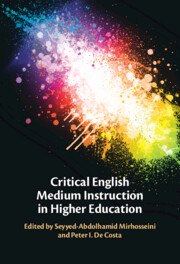Book contents
- Critical English Medium Instruction in Higher Education
- Critical English Medium Instruction in Higher Education
- Copyright page
- Contents
- Figures and Tables
- Contributors
- Foreword
- 1 Critical Views of English Medium Instruction
- Part I Ideologies and Educational Policies
- Part II Identity and Educational Justice
- Part III The Politics of English in Education
- 10 Problematizing ‘English’ in EMI
- 11 A Fractured Dream of the Decolonisation and De-eliticisation of English within EMI Programmes in South Asia
- 12 Reproducing the Dominance of English through EMI in Postapartheid South Africa
- 13 EMI, Cognitive Capture and Decoloniality
- Afterword
- Index
- References
12 - Reproducing the Dominance of English through EMI in Postapartheid South Africa
from Part III - The Politics of English in Education
Published online by Cambridge University Press: 31 January 2025
- Critical English Medium Instruction in Higher Education
- Critical English Medium Instruction in Higher Education
- Copyright page
- Contents
- Figures and Tables
- Contributors
- Foreword
- 1 Critical Views of English Medium Instruction
- Part I Ideologies and Educational Policies
- Part II Identity and Educational Justice
- Part III The Politics of English in Education
- 10 Problematizing ‘English’ in EMI
- 11 A Fractured Dream of the Decolonisation and De-eliticisation of English within EMI Programmes in South Asia
- 12 Reproducing the Dominance of English through EMI in Postapartheid South Africa
- 13 EMI, Cognitive Capture and Decoloniality
- Afterword
- Index
- References
Summary
Although English is one of South Africa’s eleven official languages, its hegemony is felt country-wide, especially in the education system, to the extent that none of the other official languages can match it. This chapter discusses some of the factors contributing to the reproduction of the dominance of English through English Medium Instruction (EMI) in South Africa, with the focus on the following: the legacy of apartheid language-in-education policies, especially the Bantu Education Act, which sought to deny Black students access to English and impose Afrikaans as the sole medium of instruction in Black schools; South Africa’s new language policy, which gives official recognition to eleven languages but has escape clauses covertly favoring English in the country’s educational system; and student protest movements, which simultaneously demand the fall of a colonial language (Afrikaans) and the continued rise of another (English) at the expense of the indigenous languages. The chapter discusses these factors in light of theoretical developments in critical linguistic theory and language economics. It explores ways in which the reproduction of the dominance of English through EMI can be approached to ensure that English and South Africa’s other official languages coexist, one not at the expense of but in addition to the others.
Keywords
- Type
- Chapter
- Information
- Critical English Medium Instruction in Higher Education , pp. 200 - 214Publisher: Cambridge University PressPrint publication year: 2025

